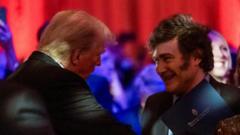Milei's decision stems from disagreements over health management, particularly during the Covid-19 pandemic, and underscores a growing trend among leaders aligned with Trump's perspective.
**Argentina's Javier Milei Follows Trump's Lead in WHO Withdrawal**

**Argentina's Javier Milei Follows Trump's Lead in WHO Withdrawal**
Argentine President Javier Milei announces the country's exit from the World Health Organization, reflecting sentiments similar to those of Donald Trump's recent withdrawal.
In a significant move mirroring recent U.S. actions, Argentine President Javier Milei has declared his administration's intention to withdraw from the World Health Organization (WHO). This announcement follows a similar decision made by U.S. President Donald Trump, just weeks prior, and appears to arise from “deep differences” in health management, predominantly highlighted during the Covid-19 pandemic.
The official statement from the Milei government cited Argentina’s long lockdowns and dissatisfaction with WHO's perceived response to the health crisis, alongside concerns regarding the organization’s affiliations with China. The admiration between the two leaders is well-documented, with Milei celebrating Trump’s political resurgence while Trump has referred to the Argentine leader as “my favourite president.”
While the U.S. withdrawal poses significant financial implications for the WHO, given that it contributes about $950 million—nearly 15% of its total budget—Argentina’s yearly contribution of around $8 million is unlikely to affect the organization’s financial landscape significantly. The repercussions of Milei's decision resonate more in terms of political alignment and the potential for other nations to follow suit.
Emphasizing national sovereignty, spokesperson Manuel Adorni articulated that Argentina seeks to avoid foreign interference in health and governance matters: “We Argentines are not going to allow an international body to interfere with our sovereignty.” This sentiment reflects Milei's ongoing critique of international entities that clash with his vision of governance.
As Milei prepares to formalize this withdrawal through an executive order, speculation grows regarding other potential exits from international agreements. Environmentalists in Argentina, in particular, express concern that Milei might also mimic Trump’s withdrawal from the Paris climate agreement.
Overall, the trend reflects a significant ideological shift in governance as leaders like Milei and Trump challenge established international collaborations in the pursuit of perceived national interests.
The official statement from the Milei government cited Argentina’s long lockdowns and dissatisfaction with WHO's perceived response to the health crisis, alongside concerns regarding the organization’s affiliations with China. The admiration between the two leaders is well-documented, with Milei celebrating Trump’s political resurgence while Trump has referred to the Argentine leader as “my favourite president.”
While the U.S. withdrawal poses significant financial implications for the WHO, given that it contributes about $950 million—nearly 15% of its total budget—Argentina’s yearly contribution of around $8 million is unlikely to affect the organization’s financial landscape significantly. The repercussions of Milei's decision resonate more in terms of political alignment and the potential for other nations to follow suit.
Emphasizing national sovereignty, spokesperson Manuel Adorni articulated that Argentina seeks to avoid foreign interference in health and governance matters: “We Argentines are not going to allow an international body to interfere with our sovereignty.” This sentiment reflects Milei's ongoing critique of international entities that clash with his vision of governance.
As Milei prepares to formalize this withdrawal through an executive order, speculation grows regarding other potential exits from international agreements. Environmentalists in Argentina, in particular, express concern that Milei might also mimic Trump’s withdrawal from the Paris climate agreement.
Overall, the trend reflects a significant ideological shift in governance as leaders like Milei and Trump challenge established international collaborations in the pursuit of perceived national interests.






















